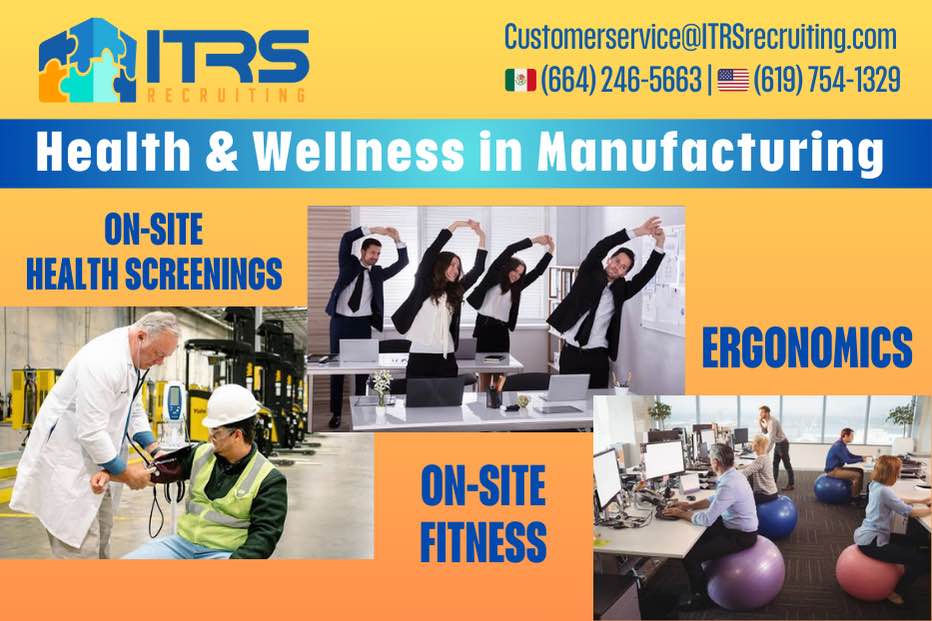Health and Wellness Programs in Manufacturing: Promoting Employee Well-Being

In today’s fast-paced industrial landscape, manufacturing companies are increasingly recognizing the importance of promoting both physical and mental well-being among their employees. This shift is not only crucial for enhancing productivity but also for fostering a positive workplace culture that attracts and retains talent. Health and wellness programs are at the forefront of this movement, offering a holistic approach to employee care.
** The Importance of Health and Wellness in Manufacturing
Manufacturing environments can be physically demanding, often requiring long hours, repetitive tasks, and exposure to potentially hazardous conditions. These factors can take a toll on employees’ physical health, leading to issues such as musculoskeletal disorders, fatigue, and chronic stress. Additionally, the mental health challenges associated with high-pressure production targets, shift work, and job insecurity can further exacerbate the situation.
Recognizing these challenges, many manufacturing companies have started to implement comprehensive health and wellness programs designed to address the specific needs of their workforce. These programs aim to reduce workplace injuries, improve overall health, and enhance job satisfaction, all of which contribute to a more engaged and productive workforce.
** Physical Well-Being Initiatives
One of the primary focuses of health and wellness programs in manufacturing is the physical well-being of employees. Companies are adopting a range of strategies to promote physical health, including:
1. Ergonomic Assessments and Adjustments: Ensuring that workstations are ergonomically designed to minimize strain and prevent injuries. This might involve adjustable workstations, anti-fatigue mats, and tools designed to reduce repetitive motion injuries.
2. On-Site Fitness Facilities: Some manufacturing companies are investing in on-site gyms or fitness centers, providing employees with convenient access to exercise during breaks or before and after shifts. These facilities often include equipment for strength training, cardiovascular exercises, and stretching areas to help employees maintain physical fitness.
3. Health Screenings and Wellness Checks: Regular health screenings, such as blood pressure monitoring, cholesterol checks, and vision tests, are offered to employees to detect potential health issues early. These screenings are often complemented by wellness checks that provide personalized advice on maintaining a healthy lifestyle.
4. Nutritional Programs: To encourage healthy eating habits, some companies offer nutritional counseling, healthy meal options in cafeterias, and even cooking classes focused on preparing nutritious meals. Access to healthy food options is a key component of maintaining physical health, especially in a demanding work environment.
** Mental Well-Being Initiatives
In addition to physical health, mental well-being is a critical component of a comprehensive wellness program. Manufacturing companies are increasingly aware of the mental health challenges their employees face and are implementing strategies to support mental wellness:
1. Stress Management Workshops: These workshops equip employees with techniques to manage stress, such as mindfulness, meditation, and time management skills. By reducing stress levels, companies can help prevent burnout and improve overall job satisfaction.
2. Employee Assistance Programs (EAPs): EAPs provide confidential counseling services for employees dealing with personal or work-related issues. These programs offer support for a wide range of concerns, including mental health, substance abuse, financial stress, and family problems.
3. Flexible Work Schedules: To help employees achieve a better work-life balance, some companies are offering flexible work schedules or shift options. This flexibility allows employees to manage their personal responsibilities more effectively, reducing stress and improving mental well-being.
4. Mental Health Awareness Campaigns: Companies are also promoting mental health awareness through educational campaigns and resources. These initiatives aim to reduce the stigma around mental health issues and encourage employees to seek help when needed.
** The Impact of Health and Wellness Programs
The implementation of health and wellness programs in manufacturing has shown significant positive impacts. Employees who participate in these programs often report improved physical health, reduced stress levels, and greater job satisfaction. For companies, the benefits include increased productivity, reduced absenteeism, and lower healthcare costs. Additionally, a strong commitment to employee well-being can enhance a company’s reputation, making it an employer of choice in the competitive manufacturing sector.
** Conclusion
As the manufacturing industry continues to evolve, the importance of health and wellness programs cannot be overstated. By prioritizing the physical and mental well-being of their employees, manufacturing companies are not only fostering a healthier workforce but also creating a more sustainable and productive work environment. Investing in comprehensive health and wellness programs is a win-win strategy that benefits both employees and employers, paving the way for long-term success in the manufacturing sector.
